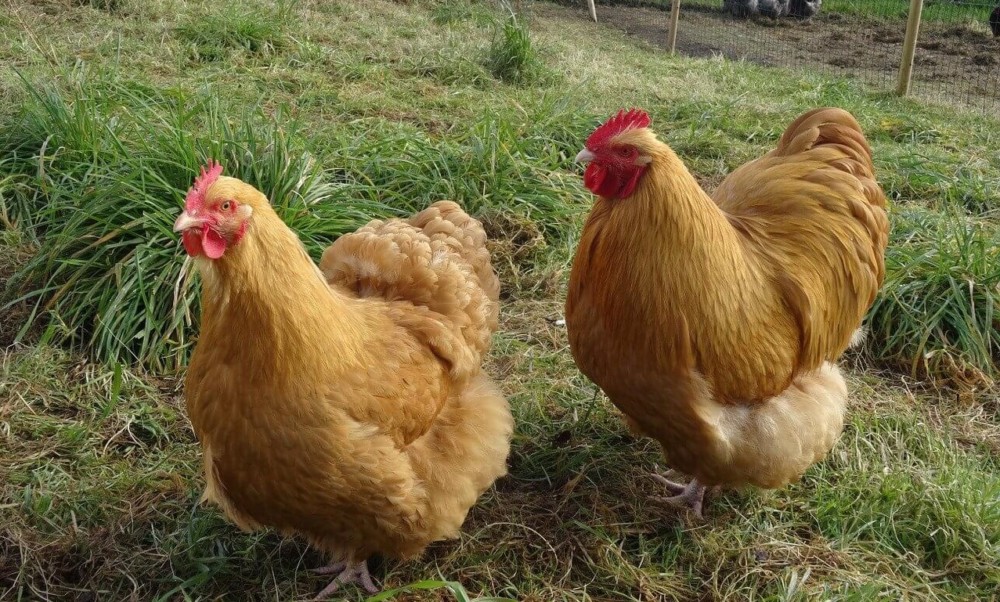Without a doubt, one of my favorite, if not very favorite, chicken breed, is the Buff Orpington. Buff Orpington chickens are calm, friendly, great with kids, and they do well in cold climates.
Are Buff Orpington Chickens Good for Beginners?
Buff Orpington Chickens are absolutely great for beginners due to their friendly and calm nature. They are known to be docile and easily handled, making them a great choice for families and individuals who are new to raising chickens.
Buff Orpington Chickens History
Originating from the town of Orpington in Kent, England, these golden-feathered birds have captured the hearts of many with their distinct character and reliable egg-laying capabilities. Their soft plumage glistening in the sunlight, a friendly demeanor that welcomes human interaction.
The promise of fresh eggs make Buff Orpingtons a preferred choice for many backyard chicken owners, including myself.
In this blog post, we will delve deeper into the world of Buff Orpington chickens, exploring their unique characteristics, temperament, and care requirements.
Whether you’re a seasoned chicken owner or just starting a backyard flock and looking for beautiful chickens, this post will provide the insights you need to appreciate and care for these wonderful creatures.
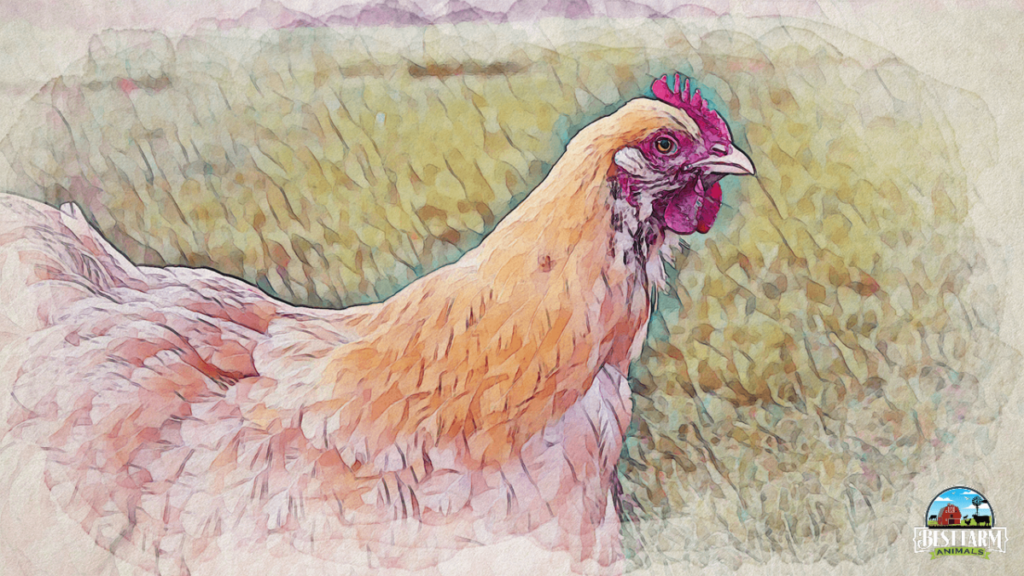
The Characteristics of Buff Orpington Chickens
Buff Orpingtons are a sight to behold, with their large, rounded bodies covered in an abundance of soft, golden feathers. Their distinctive plumage not only enhances their aesthetic appeal. It also serves a practical purpose – offering exceptional insulation during colder months.
This cold-hardy feature traces back to their roots in Orpington, a town located in Kent, England. That’s where they were selectively bred in the late 19th century for their appearance and dual-purpose capabilities.
Buff Orpington Characteristics
One of the key traits that I’ve admired in my Buff Orpingtons over the years is their adaptability to various climates. Their feathering provides excellent protection against the cold.
This enables them to maintain their health and egg production even in less-than-ideal conditions.
Whether it’s the scorching summer sun or the frosty winter breeze, these chickens have repeatedly proven their resilience.
Are Buff Orpingtons Good Egg Layers?
The Buff Orpington’s reputation as great layers is well deserved, with each hen capable of producing around 200 large, brown eggs annually. However, it’s essential to remember that, like people, each chicken is an individual, and the number of eggs can vary.
But, regardless of the exact count, there’s an unmatched joy in walking to the coop each morning and finding a clutch of fresh eggs waiting to be collected.
The rich, farm-fresh taste of Buff Orpington eggs is something every chicken owner and home cook should experience.
How often do Buff Orpington Chickens lay eggs? Under optimal conditions, they typically lay an egg approximately every 1.5 to 2 days. This means you can expect an average of around 4 to 5 eggs per hen per week.
This can vary based on factors like the chicken’s age, diet, health, and environmental conditions.
How Many Eggs Does a Buff Orpington Chicken Lay?
While Buff Orpingtons are admired for many reasons, their reliable egg-laying abilities often take center stage.
Each Buff Orpington hen can lay approximately 200-280 large, brown eggs annually under optimal conditions.
This impressive egg-laying rate translates to roughly four to five eggs per week, substantially contributing to a family’s egg supply. If you have a flock of Buff Orpingtons, you’re less likely to rely on store-bought eggs, and you get to enjoy the unbeatable taste of homegrown, fresh eggs daily.
The size of the eggs that Buff Orpingtons produce is another point of admiration.
Buff Orpingtons typically lay large, sometimes even extra-large eggs.
These are perfect for baking and cooking, as they add more volume and richness to the dishes than standard-sized eggs.
One of the unique aspects of Buff Orpingtons is that they continue laying eggs even during the colder months. Many chicken breeds decrease their egg production significantly or stop laying altogether in winter due to decreased daylight hours and colder temperatures.
However, with their resilient nature and well-insulated bodies, Buff Orpingtons can maintain consistent egg production throughout the year. This trait makes them an excellent choice for those living in regions with harsh winters.
Another noteworthy trait is their broodiness. Buff Orpington hens often exhibit a strong desire to incubate their eggs and raise chicks. If you’re interested in expanding your flock naturally, this breed makes it quite possible and, dare I say, exciting.
Watching a Buff Orpington hen mother her chicks is a heartwarming experience that adds another layer of joy to the backyard chicken-raising journey. My kids have loved it each spring as our Buff Orpington hens go broody and hatch little clutches of chicks.
However, remember that while broodiness can be a desirable trait, it also means that the hen will stop laying eggs for a while. (That’s one reason we have a mixed flock.)
During brooding, a hen’s energy is entirely focused on incubating the eggs and caring for the chicks. If you rely on a steady supply of eggs, you’ll need to plan around this brooding period or have other non-broody hens in your flock.
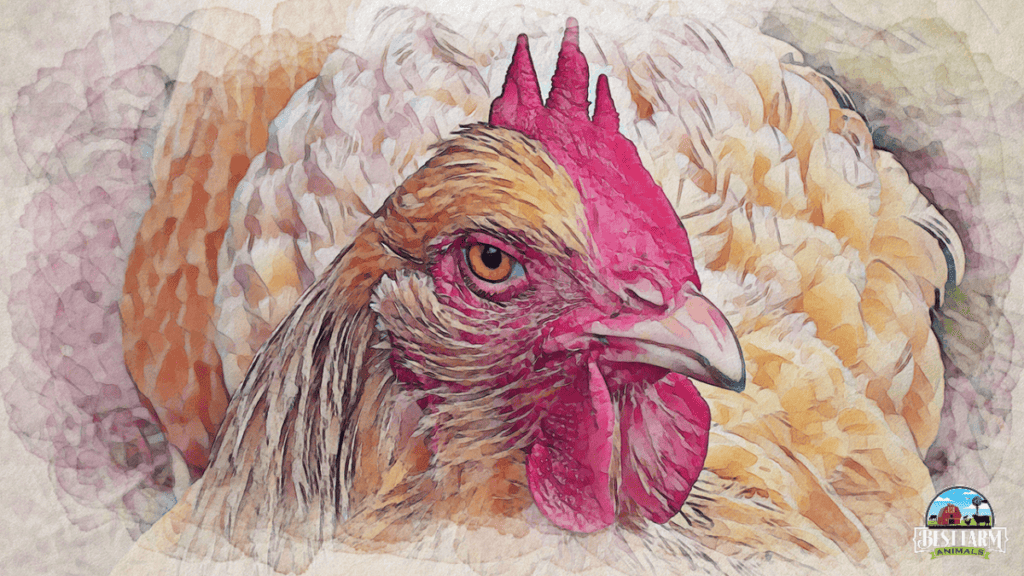
Temperament and Personality of Buff Orpington Chickens
When we discuss the charm of Buff Orpington chickens, it’s impossible not to mention their delightful temperament. These birds are not just attractive and productive; they’re incredibly sociable and friendly too. This feature sets them apart from many other chicken breeds and makes them a truly cherished addition to our backyard.
Buff Orpingtons are Great Pet Chickens
Buff Orpingtons are known for their docile and calm demeanor. They are not flighty birds and exhibit a low tendency to be skittish or anxious. Their relaxed nature makes them easy to handle, an attribute particularly advantageous for families with children.
My Buff Orpingtons allow my kids to carry them around and are happy to follow the kids when they aren’t being loved on.
Children can learn valuable lessons in responsibility and compassion by interacting with these gentle birds, and it’s always a joy to see the bond growing between them.
Another aspect that I find endearing is their curious and interactive nature. They’re often the first to come running (in their cute, waddling way) when I step into the backyard, expecting treats or a gentle petting session. This level of sociability extends to being held and petted, making Buff Orpingtons excellent chickens for those who desire pets that they can hold and interact with regularly.
Gentle Means Lower on The Pecking Order
Despite their large size, these birds are often considered “gentle giants” due to their friendly nature. They get along well with other chickens and are usually peaceful cohabitants in a mixed-breed flock.
However, due to their docile nature, they can sometimes find themselves at the lower end of the pecking order. This isn’t usually a cause for concern, but it’s always a good idea to keep an eye on flock dynamics to ensure all your chickens are safe and comfortable.
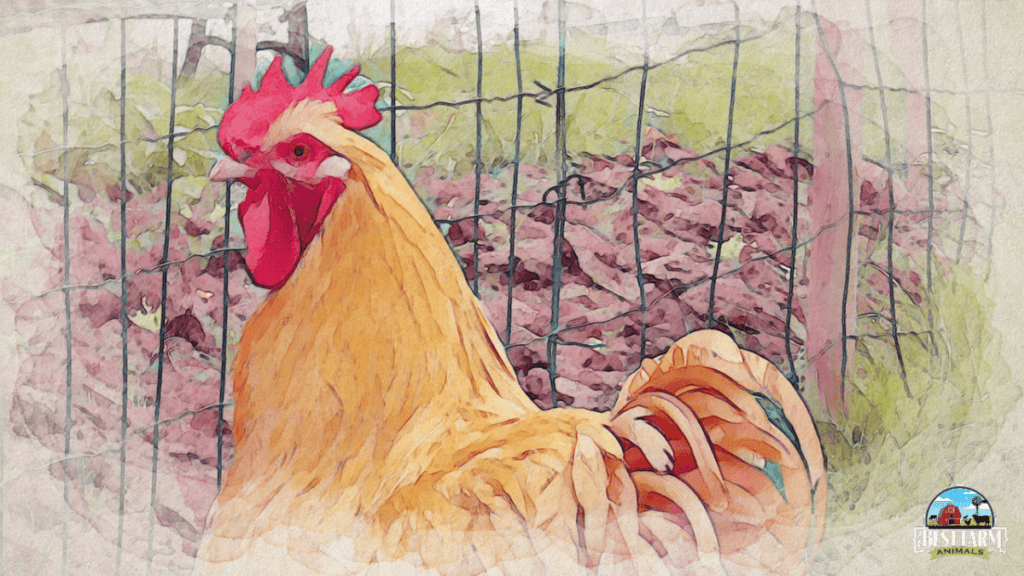
Caring for Buff Orpington Chickens
Raising Buff Orpington chickens is a rewarding journey, but it’s essential to remember that like all pets, they require proper care and attention. Providing the right environment and diet is crucial for their health, productivity, and overall well-being.
Buff Orpington Chickens Dietary Needs
Starting with their diet, Buff Orpingtons need a balanced and nutritious feeding regime. Commercially available poultry feeds are generally well-suited for their dietary needs, providing an optimal mix of proteins, carbohydrates, vitamins, and minerals.
Treats and kitchen scraps can be given in moderation. But remember that they should not make up more than 10% of your chickens’ diet.
Clean and fresh water should always be available. Chickens can consume a surprising amount of water daily, especially in hot weather, so it’s important to check their water supply regularly.
A lack of adequate water can lead to dehydration and drop egg production.
Housing Needs: How Much Space Do Buff Orpington Chickens Need?
Regarding housing, these birds need a secure and comfortable coop. Due to their large size, Buff Orpingtons require slightly more space than smaller breeds.
A general rule of thumb is to provide at least 4 square feet of coop space per chicken, with ample roosting bars for them to sleep on.
The coop should be well-ventilated, free from drafts, and secure from predators.
Parasite Concerns
In addition, Buff Orpingtons, with their dense feathering, are prone to parasitic infestations, such as mites and lice. Regular health checks and appropriate treatment are crucial to keep these parasites at bay.
Because Buff Orpingtons can often find themselves at the bottom of the pecking order, it’s vital to ensure that it doesn’t escalate to bullying or injuries.
If you provide enough space, multiple feeding and watering stations, and hiding places, your flock won’t squabble or fight as much.
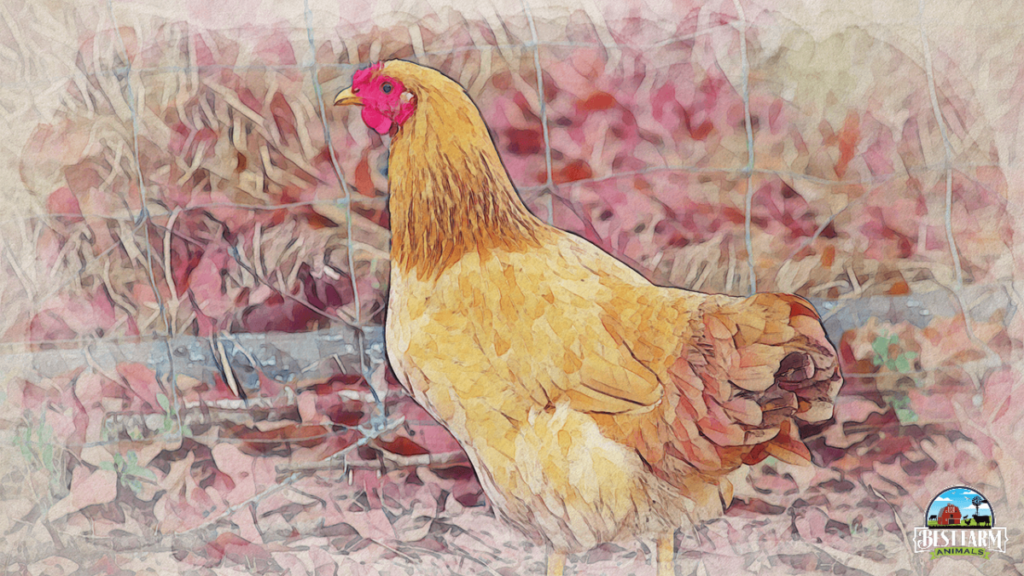
Frequently Asked Questions about Buff Orpington Chickens
What makes Buff Orpington Chickens unique?
Buff Orpington Chickens are known for their striking golden buff feathers, which give them a warm and welcoming appearance. They have a large, round body shape and a docile temperament, making them ideal for backyard flocks and family-friendly environments.
Are Buff Orpington Chickens good egg layers?
Buff Orpington Chickens are excellent layers of large brown eggs. While they may not produce eggs as frequently as some other breeds, they make up for it with their consistent egg production throughout the year. Buff Orpingtons are also known to be broody, making them excellent mothers for hatching and raising chicks.
How do Buff Orpington Chickens handle various climates?
Buff Orpington Chickens are hardy birds that can adapt well to different climates. They have a thick layer of feathers that provides insulation, making them better suited for colder environments compared to some other breeds. However, they can also tolerate heat as long as they have access to shade and fresh water.
How big do Buff Orpington Chickens get?
Buff Orpington Chickens are considered a large breed. Roosters typically weigh between 8 to 10 pounds (3.6 to 4.5 kilograms), while hens generally weigh between 6 to 8 pounds (2.7 to 3.6 kilograms). Their size and sturdy build contribute to their gentle and robust nature.
Are Buff Orpington Chickens good with children and other pets?
Buff Orpington Chickens are excellent with children and other animals. They are known for their friendly and calm disposition, making them excellent children companions. They are generally tolerant of being handled and enjoy human interaction. When properly introduced and supervised, Buff Orpingtons can also get along well with other pets, such as dogs and cats.
What kind of housing and care do Buff Orpington Chickens require?
Buff Orpington Chickens require a safe and secure coop or housing to protect them from predators and the elements. Provide ample space for them to move around, access to fresh water, and a balanced diet of chicken feed supplemented with kitchen scraps and occasional treats. Regular cleaning and maintenance of the coop are also essential for their health and well-being.
Can Buff Orpington Chickens be shown in poultry exhibitions?
Buff Orpington Chickens are a popular breed for poultry shows and exhibitions. Their stunning buff-colored plumage and distinctive appearance make them an attractive choice for exhibitors. It’s important to note that breed standards and requirements may vary depending on the specific show or competition.
My Favorite Chicken and Duck Supplies
This list contains affiliate products. Affiliate products do not cost more but helps to support BestFarmAnimals and our goal to provide farm animal owners with accurate and helpful information.
Manna Pro Oyster Shell keeps eggs strong. Before I gave my chickens oyster shell, I had the oddest eggs, many with weak and irregular shells. Now, I don’t have an issue.
Layer Feed by Manna Pro. I like pellets rather than crumbles as my chickens eat them better and less gets wasted or scavenged by rodents. A good layer feed makes the difference in hens laying many more eggs.
My chickens love this mealworm treat, which gives added protein, something that’s great during molting and winter months.
There are many ways to feed and water your chickens. I like this food and water setup the best because it reduces waste, saves me time feeding and watering, and keeps the food fresh longer. Except, in the winter, I use a heated waterer. The only problem is the heated waterers need to be replaced every few years.
I love this chicken veggie hanger. It makes it easy to give your chickens produce from the garden and keep them occupied in the winter with a fresh head of lettuce.
These chicken toys are a hoot! They will help curb bullying and keep your chickens active, especially in the winter when hens tend to get more lethargic.
Conclusion: Why Buff Orpingtons are the Perfect Choice
If I only got to choose one chicken breed to raise- I’d choose the Buff Orpington Chicken Breed because of their versatility, friendliness, and reliability in providing eggs.
I’m excited to share that our next blog post will spotlight another incredible breed – the Rhode Island Red chickens.
Until then, happy chicken raising! Remember, each day with your feathery friends is a chance to learn, enjoy, and appreciate life’s simple yet profound pleasures.

